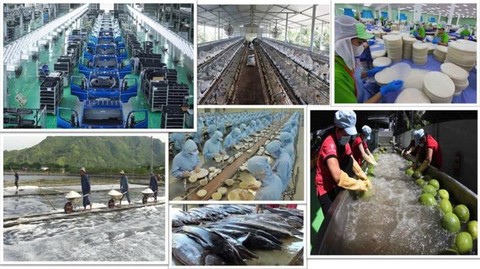(CATP) That was the emphasis made by businessman Đặng Văn Thành (Chairman of TTC Group) when sharing his perspective on Resolution 68 of the Politburo regarding the development of the private economy. From a businessman's point of view, the most important aspect is turning the resolution into reality, as it serves as a driving force for economic development.
Speaking with a reporter from Công an TPHCM about the private economy and the contents of Resolution No. 68 issued by the Politburo, businessman Đặng Văn Thành expressed his enthusiasm. He shared that both the business community at large and he personally strongly support Resolution 68—especially in the current context where nearly 1 million enterprises are operating and the private economy continues to maintain solid growth. It is the sector contributing the most, accounting for around 50% of the GDP.
According to Mr. Thành, the Party and the State have always shown great attention and provided the best conditions for the business community and entrepreneurs. In particular, Resolution 68 has defined the private economy as the most important driving force behind a self-reliant and sustainable economy and affirmed that Vietnamese entrepreneurs are "soldiers on the economic front" in the new era. This, he emphasized, is a tremendous source of motivation for the entrepreneurial force.

Entrepreneur Đặng Văn Thành – Chairman of TTC Group.
Previously, even before Resolution 68 was introduced, the entrepreneur community was already fulfilling its mission. For example, over the past 20 years, entrepreneur Đặng Văn Thành has held hundreds of training sessions and shared his management and operational experience across various provinces throughout the country to inspire young entrepreneurs, startups, and senior executives. However, with the introduction of Resolution 68, the sense of patriotism and responsibility toward the nation among entrepreneurs is now more strongly affirmed than ever. Mr. Thành has always aligned the mission of his enterprises with national responsibility.
For instance, when investing in sectors like healthcare or education, a visionary and committed entrepreneur does not simply see it as a business opportunity, but rather as a responsibility—to ensure that patients do not have to travel to big cities for treatment, and that children can access high-quality healthcare and education locally instead of going abroad. This not only reduces pressure on central urban areas but also helps limit foreign currency outflow. That is how businesses can accompany the country in a practical and sustainable way.
He believes the highest mission of an entrepreneur is to contribute to the nation. When entrepreneurs perform well, they not only generate economic value but also build reputable personal brands. A collection of reputable personal brands contributes to the creation of high-quality product brands. With many quality products, strong corporate brands are formed. These strong businesses become the foundation for building a powerful national brand.
Turning Vision into Reality
In the early years of Vietnam’s economic reforms, the private sector played only a secondary role. At that time, the economy mainly relied on the state sector and foreign direct investment (FDI). Mr. Thành recalled that during his time in the banking sector, he had the opportunity to work with many international investors—who often had excellent strategic vision. But he was also candid in expressing: “We don’t just need capital—we need experience, technical expertise, and a long-term vision to develop together.”
In a developing country with an open economy, leveraging FDI as a "springboard" is essential. However, that springboard is a short-term tool. Once a business matures, the springboard becomes ineffective. True sustainable development must come from internal strength—strategy, governance, innovation, technology—and, above all, the entrepreneur’s will, determination, and sense of responsibility. That’s why Resolution 68 serves as a “key” to unlock the path for domestic businesses to deeply integrate into the global economy.
He highly appreciates the eight task groups and solutions outlined in the Resolution, especially the clear allocation of responsibilities from the central to local levels, ensuring the Resolution is not just policy on paper, but action that takes root in real life.

The private economy is a driving force for economic growth.
On methodology, there are many groundbreaking innovations that remove barriers for the private sector to develop—for example, allowing citizens and businesses the freedom to operate in industries not prohibited by law, and reviewing and improving tax policies. However, what Mr. Thành is most enthusiastic about are the four core criteria for evaluating private enterprises according to international standards: legal compliance, job creation, contributions to the state budget, and participation in social welfare activities. These are the guiding principles that TTC Group has steadfastly implemented throughout its formation and development.
Speaking further on the content of Resolution 68, Mr. Thành expressed strong confidence in the determination of the Politburo, especially its leadership. The Resolution itself establishes a clear monitoring mechanism to oversee its implementation. Through strict supervision, enforcement will be both effective and efficient. With strong determination and consensus from the political system down to the business community, success is assured.
Creating Momentum for Economic Growth
Mr. Đặng Văn Thành remarked: “Bringing Resolution 68 to life is a strategic decision of strategic importance.” He highly appreciated the spirit of business support clearly expressed in the resolution. According to him, enabling enterprises to grow also creates momentum for economic growth and increases tax revenue. In other words, it’s about "nurturing enterprises" to generate sustainable revenue. He likened it to: "Raising a healthy, educated child will result in a valuable contributor to family and society. Similarly, when enterprises are given appropriate mechanisms and policies, they will contribute sustainably to the economy.”
Regarding the topic of “Promoting and diversifying capital sources for the private economy,” he shared an analogy from financial history: like a crab with two claws—the monetary market and the capital market. The monetary market was formed first and mainly serves short-term capital and payment tools. As the economy evolved, the demand for medium- and long-term capital emerged, leading to the necessary formation of a transparent and properly functioning capital market.
A market economy welcomes everyone but bows to no one. If a business lacks good management, governance, and control, it will face bankruptcy. That is simply the natural law of competition and elimination.
Mr. Thành affirmed: In the capital market, there’s no such thing as "withdrawing capital"—only the concept of "changing ownership." The value of the capital market is determined by the strength of the enterprise itself. Therefore, to build a transparent and sustainable capital market, enterprises themselves must be transparent and continuously develop. Capital must be understood in two forms: debt securities (which cannot change ownership) and equity securities (which can). When the market operates effectively, it provides a solid financial foundation for long-term development of the private sector.
From the perspective of an entrepreneur with nearly five decades of experience in the business world, Mr. Thành believes Resolution 68 is a refined policy, demonstrating strategic vision—issued at a particularly significant moment for the development of the private sector, especially as the global economy continues to shift and demands rapid, sustainable growth.
Recently, in line with the Government’s orientation to develop an international financial center in Vietnam, two cities have been selected: Đà Nẵng and Ho Chi Minh City. Ho Chi Minh City will serve as the traditional financial hub with a strong banking, securities, and investment ecosystem, while Đà Nẵng enjoys advantages in geographic location, modern infrastructure, high-quality human resources, and strong regional connectivity. The capital and monetary-banking markets are essential foundational elements for the development of financial centers. This will be a significant driving force for private sector growth.
With 46 years of formation and development, TTC is a multi-industry investment group operating in six core sectors: agriculture, energy, real estate, industrial real estate, tourism, and education—along with various other fields such as trade, logistics, construction, steel structures, and healthcare. TTC operates across Vietnam as well as in Laos, Cambodia, Singapore, and Australia. With a sustainable development vision and the commitment “For the community, for local development,” TTC applies ESG (Environmental, Social, and Governance) international standards—developing its economy while supporting local communities to deliver long-term benefits, particularly in the context of global integration.
According to Công An (People’s Public Security Newspaper)